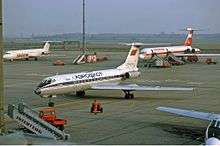Berlin Schönefeld Airport
Berlin Schönefeld Airport (![]()
Berlin Schönefeld Airport Flughafen Berlin-Schönefeld | |||||||||||
|---|---|---|---|---|---|---|---|---|---|---|---|
 | |||||||||||
.jpg) | |||||||||||
| Summary | |||||||||||
| Airport type | Public | ||||||||||
| Operator | Flughafen Berlin Brandenburg GmbH | ||||||||||
| Serves | Berlin, Germany | ||||||||||
| Location | Schönefeld | ||||||||||
| Focus city for | |||||||||||
| Elevation AMSL | 157 ft / 48 m | ||||||||||
| Coordinates | 52°22′43″N 013°31′14″E | ||||||||||
| Website | berlin-airport.de | ||||||||||
| Map | |||||||||||
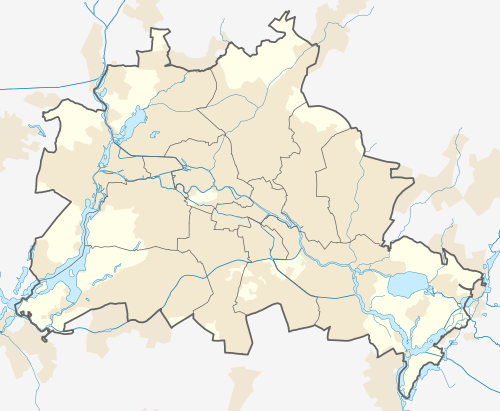 SXF Location relative to Berlin | |||||||||||
| Runways | |||||||||||
| |||||||||||
| Statistics (2018) | |||||||||||
| |||||||||||
Schönefeld Airport was the major civil airport of East Germany (GDR) and the only airport of the former East Berlin. Part of Schönefeld's existing infrastructure is set to be incorporated into the neighbouring Berlin Brandenburg Airport, scheduled to open in late 2020.[2] Schönefeld's then refurbished terminals are intended to be used until at least 2026 as part of the new airport[3] named Terminal 5.
History
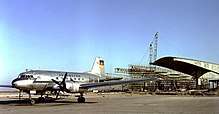
First years, World War II, and GDR period: 1934-1990
On 15 October 1934 construction began to build three 800 metres (2,600 ft) long runways to serve the Henschel aircraft plant in Schönefeld. By the end of the Second World War, over 14,000 aircraft had been built. On 22 April 1945, the facilities were occupied by Soviet troops, and the plant was dismantled and demolished. By late 1947, the railway connection had been repaired and agricultural machinery was built and repaired on the site.
In 1946, the Soviet Air Forces moved from Johannisthal Air Field to Schönefeld, including the civil airline Aeroflot. In 1947, the Soviet Military Administration in Germany approved the construction of a civilian airport at the site.
A stipulation of the Four Power Agreement following World War II was a total ban on German carriers' participation in air transport to Berlin, where access was restricted to American, British, French, and Soviet airlines. Since Schönefeld airport was located outside the city boundaries of Berlin, this restriction did not apply. Thus, aircraft of the East German flag carrier Interflug could use Schönefeld airport, while West German Lufthansa was denied access to Tegel or Tempelhof airports.
Development after German reunification: 1990-present
Berlin Schönefeld Airport has seen a major increase in passenger numbers over recent years, which was caused by the opening of bases for both easyJet and Germanwings. In 2008, the airport served 6.6 million passengers.
Following German reunification in 1990, operating three separate airports became increasingly cost-prohibitive, leading the Berlin legislature to pursue plans for a single airport that would be more efficient and would decrease the amount of aircraft noise from airports within the city. Therefore, it was decided to build Berlin Brandenburg Airport at the current site of Schönefeld Airport, originally scheduled to open in late 2012. For various reasons, mainly issues with the fire alarm/safety system, the opening has been postponed to November 2020.
The new airport will share only one runway with the existing one – the current runway will become the north runway of the new airport. Most of the old Schönefeld Airport, including the terminal and apron areas, will undergo complete urban redevelopment following its closure. Part of the old apron area will be used by the future new passenger terminal of the German government used for state visits and other state flight operations.[4]
At the start of the winter season in 2012 Germanwings left Schönefeld for Berlin-Tegel to maintain closer operations within the Lufthansa Group there.[5] However, to provide competition for Ryanair's new routes, Germanwings announced a return to Schönefeld in addition to their Tegel operations from October 2015.[6]
Aer Lingus also announced it would switch airports within Berlin, from Schönefeld to Tegel, by March 2015.[7] Meanwhile, Ryanair announced the establishment of their sixth German base in Schönefeld by 27 October 2015 by deploying five aircraft to the airport and adding 16 new routes.[8]
On 2 May 2015, aircraft departing from Schönefeld became the first commercial flights to use the southern runway of the new Berlin Brandenburg Airport, which temporarily became Schönefeld's only runway while its own, which will become the northern runway of the new airport, was renovated.[9]
Extension work at Schönefeld Airport was completed in 2016. Terminal K was extended by approx. 600 square metres (6,500 sq ft) and the baggage area was also enlarged by 40 per cent. Terminal M2, an entirely new arrival terminal was built west of Terminal M. Spanning almost 3,800 square metres (41,000 sq ft), this building features three baggage carousels and the coach parking area was relocated to a new area in P6.[10]
The airport is still seeing exceptionally high growth of passenger numbers with Berlin's economic growth. As of November 2016, the airport operates near full capacity despite several additions to the infrastructure in recent years.[11] As of late 2018, construction works began to upgrade the airport to be used as part of its successor, nearby Berlin Brandenburg Airport until at least 2026.[3]
Terminals
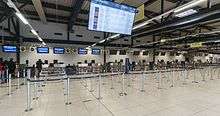
Schönefeld Airport consists of the four terminals K, L, M, and Q.[12] These terminals are located next to each other but have separate landside areas. However, they are connected through a joint airside concourse. Terminal Q has no check-in facilities, it is used exclusively for passengers clearing security checks to enter the airside boarding gates. Due to a lack of space, there are not as many facilities as those at many other international airports. There are some shops, however, including duty-free, newsstands, a few fast food restaurants, and a single airline lounge. As of April 2020, the four terminals A, B, C, D were given new names K, L, M, Q to avoid duplicate names of terminal sections of the new Berlin-Brandenburg Airport.[13]
Terminal L
The main building is the original part of the airport. It houses check-in for Terminals K and L. Terminal L features check-in counters L01–L18, with the largest user being Ryanair alongside several other airlines like Aeroflot.
Terminal K
Terminal K, located in a side wing, was originally reserved for transit passengers to and from West Berlin who took advantage of cheaper airfares and package tours arranged by an East German travel agency. Nowadays, it is used exclusively by EasyJet with check-in counters K20–K29 and has been refurbished in recent years. The airside consists of three jet bridges as well as several walk-boarding aircraft stands located at Pier 3a, an extension that was opened in 2005. Pier 3a was under extensive reconstruction until mid-2019 to allow use as part of the new Berlin Brandenburg Airport.[3]
Terminal Q
Terminal Q was originally built in the early 1980s as an external VIP lounge called "Sonderraum" (Special Room), and was tightly secured by the Ministry for State Security (Stasi). Admitted were only official guests of the East German government and its subordinated organizations. Check-in and all mandatory controls were either waived or done invisibly for travelers. After 1990, the Special Room was converted into Terminal Q to accommodate highly security-sensitive flights like those of Israeli airlines, but also for charter flights to North America. It was reconfigured in 2008 to handle sightseeing trips and flights in connection with special events.[14] It was further reconfigured in 2015 to provide access to all terminal gates. To reduce congestion in other terminals, it now houses additional security checkpoints for passengers who are checked in and have checked their luggage or only carry hand luggage.[15]
Terminal M
Terminal M was opened in December 2005 due to rapidly growing passenger numbers. Being nearly identical to Terminal C at Berlin Tegel Airport, it features check-in counters M40–M57, which are mainly used by Ryanair, Condor, and Norwegian Air Shuttle. It does not feature jet bridges but several walk-boarding stands. In November 2016, the new 4,500 square metres (48,000 sq ft) large arrivals area M2 opened right next to Terminal M.[11]
Airlines and destinations
The following airlines operate regular scheduled and charter flights at Berlin Schönefeld Airport:[16]
Other facilities
Statistics
_AN1059122.jpg)
.jpg)
Annual traffic
| Year | Passengers | % Change |
|---|---|---|
| 2000 | 2,209,444 | |
| 2001 | 1,915,110 | |
| 2002 | 1,688,028 | |
| 2003 | 1,750,921 | |
| 2004 | 3,382,106 | |
| 2005 | 5,075,172 | |
| 2006 | 6,059,343 | |
| 2007 | 6,331,191 | |
| 2008 | 6,638,162 | |
| 2009 | 6,797,158 | |
| 2010 | 7,297,911 | |
| 2011 | 7,113,989 | |
| 2012 | 7,097,274 | |
| 2013 | 6,727,306 | |
| 2014 | 7,292,517 | |
| 2015 | 8,526,268 | |
| 2016 | 11,652,922 | |
| 2017 | 12,865,312 | |
| 2018 | 12,725,937 | |
| 2019 | 11,417,435 | |
Busiest routes
| Rank | Destination | All passengers | Operating airlines |
|---|---|---|---|
| 1 | Cologne/Bonn | 428,703 | Ryanair |
| 2 | There are no further scheduled domestic services | See Berlin-Tegel Airport | |
| Rank | Destination | All passengers | Operating airlines |
|---|---|---|---|
| 1 | London-Gatwick | 486,222 | Easyjet |
| 2 | Barcelona | 459,363 | Easyjet, Ryanair |
| 3 | Basel/Mulhouse | 438,698 | Easyjet |
| 4 | London-Stansted | 436,444 | Ryanair |
| 5 | Moscow-Sheremetyevo | 409,388 | Aeroflot |
| Rank | Destination | All passengers | Operating airlines |
|---|---|---|---|
| 1 | Tel Aviv-Ben Gurion | 290,622 | Astra Airlines, Easyjet, El Al |
| 2 | Istanbul-Sabiha Gökcen | 153,251 | Pegasus Airlines |
| 3 | Antalya | 128,805 | Corendon Airlines, Freebird Airlines, Germania, Pegasus Airlines |
| 4 | Hurghada | 71,213 | Corendon Airlines, Germania |
| 5 | Cairo | 44,071 | EgyptAir |
Ground transportation
Train
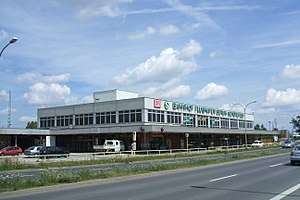
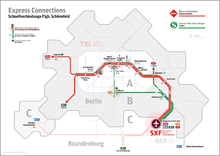
Berlin Schönefeld Airport is served by Berlin-Schönefeld Flughafen railway station, a short walking distance through a ground-level covered walkway from the airport terminals K-Q. Berlin Central Station (Berlin Hbf) is served directly by regional trains (RE Regional-Express or RB Regional-Bahn). These run every 30 minutes and transit through Berlin Ostbahnhof, Alexanderplatz, Friedrichstraße, Berlin Central Station (after 30 minutes), Zoologischer Garten, Charlottenburg, and beyond. Berlin S-Bahn lines S9 and S45 run every twenty minutes, but only the S9 goes through Berlin Central Station.
Car
The airport can be reached via the nearby motorway A113 (Exit Schönefeld Süd) which itself is connected to motorways A100 which leads to Berlin city center and A10 which circles around Berlin and connects further to all directions.
Bus
The airport is linked by local BVG bus lines 162 (towards Adlershof) and 171 (towards Neukölln). Additionally the X7 bus service provides a connection to the Berlin U-Bahn network at Rudow Station.[39] At night, the underground replacement bus N7 is available.
Accidents and incidents
- On 14 August 1972, an Ilyushin Il-62 aircraft of Interflug (registered DM-SEA) crashed near Königs Wusterhausen shortly into a flight to Burgas, killing all 156 passengers and crew on board.
- On 22 November 1977, a Tupolev Tu-134 aircraft of Interflug (registration DM-SCM) crashed upon landing at Schönefeld Airport due to a falsely configured autopilot. There were no fatalities among the 74 passengers and crew, but the aircraft was damaged beyond repair.[40]
- On 19 August 1978, LOT Polish Airlines Flight 165, a LOT flight from Gdańsk-Rębiechowo Airport to Schönefeld (carried out on a Tupolev Tu-134, registration SP-LGC), was hijacked and forced to land at Tempelhof Airport in West Berlin, thus having been used as a means for escaping the Eastern Bloc. In these cases, perpetrators were usually not charged by Western authorities.[41]
- On 12 December 1986, Aeroflot Flight 892 an Aeroflot Tupolev Tu-134 (registration CCCP-65795) coming from Minsk Airport crashed in Berlin Bohnsdorf on its approach towards Schönefeld airport, after having attempted to land on a runway that was temporarily blocked for construction work, killing 72 of the 82 passengers and crew on board.[42]
- On 17 June 1989, an Ilyushin Il-62 aircraft of Interflug (registration DDR-SEW) bound for Moscow crashed shortly after take-off into a field near the airport and caught fire. 21 people on board as well as one person on the ground were killed. The East German authorities feared an act of sabotage due to the anniversary of the East German uprising, which led to a delayed aid for injured people. West Berlin rescuers offering help were denied access to the scene. The cause for the accident was later given as a jammed rudder due to a manufacturing defect.[43]
- On 28 March 2000, a Boeing 737-300 of Germania (registration D-AGES) operating a charter flight on behalf of LTU from Tenerife South Airport to Schönefeld was the subject of an attempted hijack in mid-flight. A passenger forced his way into the cockpit, where he attacked the pilot, leading to a sudden loss of altitude. The perpetrator was restrained and the flight continued to Berlin.[44]
- On 19 June 2010, a 1944-built, historic Douglas DC-3 D-CXXX of Berlin Air Services crashed shortly after takeoff on a local sightseeing flight, causing 7 injuries but no fatalities.[45]
See also
References
- "EAD Basic". Ead.eurocontrol.int.
- Berlin's new airport to finally open in October 2020 - Reuters, 15 December 2017
- Neumann, Peter (14 December 2018). "Mehr Geld für Ausbau: Flughafen Schönefeld bleibt bis 2026 – und soll wachsen" [More money for expansion: Schönefeld Airport will remain until 2026 - and will grow]. Berliner Zeitung (in German).
- "Flughafen Berlin Brandenburg: Regierungsterminal in der Warteschleife | Hauptstadtflughafen – Berliner Zeitung" (in German). Berliner-zeitung.de.
- "Germanwings zieht nach Berlin-Tegel". Spiegel.de. 4 September 2012.
- "Germanwings stellt sich Konkurrenz durch Ryanair". airliners.de. Retrieved 4 June 2015.
- "Aer Lingus to switch Berlin flights from Schönefeld to Tegel". ch-aviation. Retrieved 4 June 2015.
- "Ryanair will mit Basis in Berlin Fluggastzahlen deutlich steigern". airliners.de. Retrieved 4 June 2015.
- "aero.de - Luftfahrt-Nachrichten und -Community". aero.de. Retrieved 4 June 2015.
- "Construction work at Schönefeld Airport: Upgrading of federal highway B96a, car park P4 closed". Flughafen Berlin Brandenburg GmbH. 15 April 2016. Retrieved 26 April 2016.
- airliners.de - "New arrivals hall to be opened at Schönefeld Airport" (German) 25 November 2016
- "Schönefeld Airport layout".
- "ABCD becomes KLMQ". Berlin Brandenburg Airport. Retrieved 31 March 2020.
- "Event and Show Terminal C". Archived from the original on 5 July 2011. Retrieved 15 February 2019.
- "Flughafen Schönefeld: Zusätzliche Kontrollspuren im Terminal C". Flughafen Berlin Brandenburg. Retrieved 15 February 2019.
- "Archived copy". Archived from the original on 17 March 2015. Retrieved 29 March 2015.CS1 maint: archived copy as title (link)
- Liu, Jim (13 December 2019). "Air Moldova schedules Berlin launch in late-March 2020". Routesonline. Retrieved 13 December 2019.
- Liu, Jim. "Blue Bird Airways Tel Aviv – Berlin service changes in S19". Routesonline. Retrieved 30 May 2019.
- condor.com - Flugplan Sommer 2020 (German) retrieved 8 June 2020
- Liu, Jim (23 January 2020). "Condor W20 Berlin operations as of 22JAN20". routesonline.com.
- Liu, Jim (7 January 2020). "Condor S20 Short-Haul network additions as of 06JAN20". routesonline.com.
- http://www.easyjet.com/it/voli-low-cost/comiso-sicilia/berlino-schoenefeld
- http://www.easyjet.com/en/routemap
- "Flight". fti.de.
- "FTI is expanding its hot water capacity with a new charter airline". airliners.de. 28 August 2019.
- Ltd. 2019, UBM (UK). "Nouvelair Tunisie expands Monastir - Germany routes from Dec 2017". Routesonline. Retrieved 15 February 2019.
- Harutyunyan, Aneta (16 October 2019). "Largest European airline Ryanair enters Armenian aviation market". Armenpress.
- https://www.routesonline.com/news/38/airlineroute/291487/ryanair-july-october-2020-portugal-operations-as-of-28may20/
- Liu, Jim (28 January 2020). "Severstal Aircompany adds limited-time Berlin flights in 2Q20". Routesonline. Retrieved 28 January 2020.
- https://wizzair.com/en-gb/information-and-services/about-us/news/2020/04/29/wizz-air-announces-a-new-base-in-lviv
- https://wizzair.com/#/
- "Anfahrt GAT Schönefeld." Private Wings. Retrieved on 7 January 2013.
- "Access Business Aviation Center/GAT." Private Wings. Retrieved on 7 January 2013.
- "Imprint." Private Wings. Retrieved on 7 January 2013. "Postal adress: [sic] PRIVATE WINGS Flugcharter GmbH Chief executive officers: Peter Paul Gatz und Andreas Wagner Flughafen Berlin – Schönefeld 12521 Berlin, Germany" and "Delivery address: Private Wings Flugcharter GmbH Waßmannsdorfer Straße 12529 Schönefeld (ehemals Diepensee)"
- "World Airline Directory." Flight International. 26 March 1988. 82. "Head Office: DDR-1189, Berlin-Schönefeld Flughafen, German Democratic Republic."
- "World Airline Directory." Flight International. 26 March 1970. 484. "Head Office: Zentralflughafen. Berlin-Schonefeld, 1189. German Democratic Republic."
- Unsere Flughäfen. "Regionale Stärke, Globaler Anschluss". www.adv.aero (in German).
- DeStatis
- "Berlin bus lines. Retrieved 23 December 2009". Bvg.de.
- "Interflug accident of 1977 at the Aircraft Accident Database. Retrieved 23 December 2009". Aviation-safety.net. Retrieved 10 January 2012.
- "LOT highjacking at the Aircraft Accident Database. Retrieved 23 December 2009". Aviation-safety.net. Retrieved 10 January 2012.
- "Aeroflot accident of 1986 at the Aviation Accident Database. Retrieved 23 December 2009". Aviation-safety.net. Retrieved 10 January 2012.
- "Interflug accident of 1989 at the Aviation Accident Database. Retrieved 23 December 2009". Aviation-safety.net. Retrieved 10 January 2012.
- "Germania attempted highjacking at the Aircraft Accident Database. Retrieved 23 December 2009". Aviation-safety.net. Retrieved 10 January 2012.
- "Accident description". Aviation Safety Network. Retrieved 20 June 2010.
External links
![]()
- Official website
- Current weather for EDDB at NOAA/NWS
- Accident history for SXF at Aviation Safety Network
